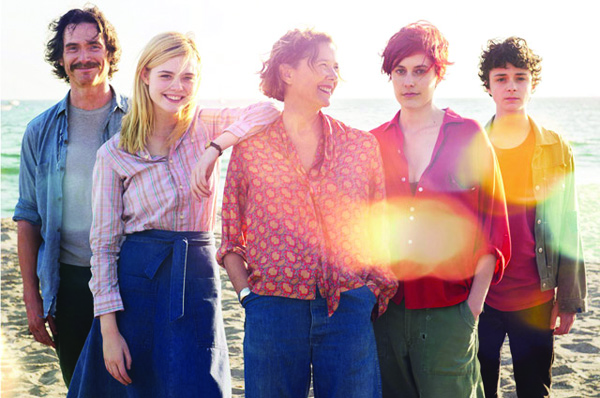20th Century Women

“Too many of us now tend to worship self-indulgence and consumption. Human identity is no longer defined by what one does, but by what one owns. But we’ve discovered that owning things and consuming things does not satisfy our longing for meaning.”
Jimmy Carter’s “crisis of confidence” speech of July 1979 brushes over a room filled with selective Scandinavian furniture to an overwhelming negative audience.
The audience’s damning comments are hushed when our main character Dorothea Fields whispers, “I thought that was beautiful.” Bewildered looks all around drop upon her, only reaffirming her feeling of being an outlier in her own household.
Dorothea’s (Annette Bening) conflict is that of a 55-year-old single mother raising a 15-year-old son named Jamie (Lucas Jade Zumann) in 1979. She tries to break down his emotional walls to figure out what type of person he is growing up to be, only to discover that neither of them know who they are becoming.
Dorothea has lived through everything from the Great Depression to a divorce that left her and Jamie by themselves. Her ennui grows as her cigarette box lessens one by one—trying to come to terms with the realization that she isn’t in a point in her life to attentively raise someone, especially a young male in the late ‘70s.
We’re exposed to Jamie’s growing sexual and emotional frustration via the platonic friend whom he always wants more from, Julie (Elle Fanning). Her discontent with complacency leads to a liberation in the form of promiscuous and unapologetic sex. She seeks Jamie’s friendly comfort to make sense of it and becomes an unofficial resident in Dorothea’s household.
The popularity and regulation of birth control in the ‘70s is personified in Abbie (Greta Gerwig). A diagnosis of cervical cancer sends her into a whirlwind of uncertainty and shock that only can be suppressed by her love of punk music.
These three women, youth Jamie and handyman William (Billy Crudup) live under the dilapidated house in Santa Barbara, California. The house being repaired by William, a man, is metaphorically mirrored in their life as well. Their house has unique character, but it’s not like it used to be. As much as a man helps rebuild the house, a woman is right behind him to do his work as well. Each woman in the film is still unsure if they need a man to repair their life or if they simply need someone there to hear them out in their standstill of life.
This is a loose autobiography of writer/director Mike Mills’ early adolescence while living with his mother. It explores the crisis of masculinity and the challenge of being raised by a single mother (or in this cased, raised by other women). Dorothea feels perpetually distant from Jamie and even moreso when she enlists Julie and Abbie to help raise him through letting him into their lifestyles to see what does or doesn’t work.
Femininity is obviously a very strong subject herein. Every woman in this story is vastly different when it comes to sex, relationships and understanding. Neither of their stories trump one another in importance or substance. They all blend perfectly to offer a naturally nostalgic, yet very prevalent story.
Mills’ direction serves stark sensibility while still having his characters pop to life. Neither loud nor disruptive in its storytelling. The soundtrack sprinkles various Talking Heads tracks along with The Buzzcocks and Suicide to incredible success. It doesn’t feel falsely nostalgic when the soundtrack creeps in, it clicks.
The score is almost nonexistent except for subtle tones under the montage sections. Mills’ choice to not color the film with select strings sections under emotional scenes that would limit its connection is a brilliant decision. Scenes will start abruptly with two characters pouring their thoughts into each other’s ears with nothing on scene besides the performances and the washed out cinematography.
It’s a snapshot of these characters’ lives in Santa Barbara in 1979. All in a growth standstill, unaware of where they are headed. From the 15-year-old boy to a 55-year-old woman, no one pretends to have their life together. Most scenes are minimalist in tone, but not in the exploration of topics.
The 20th Century Women deals with the harsh rationale of thinking every relationship you have —platonic, parental or romantic—may be the right one. Dorothea had Jamie at the worst time in her life and simply wants him to not go down the path she went down. Jamie doesn’t know what he’s doing, but assures everyone he does. Everyone in this snapshot is dramatically changed after 1979.
It is about finding yourself out while your current situation is filled with worry and uncertainty. Never is this more certain than during a conversation with Julie and Jamie. Jamie is curious – why does she keep trying with various men if 50 percent of the time, she regrets it. Julie replies, “because fifty percent of the time, I don’t.”
Follow Kevin on Twitter: @KevTudor
Follow other film related activity from Kevin on Letterboxd.